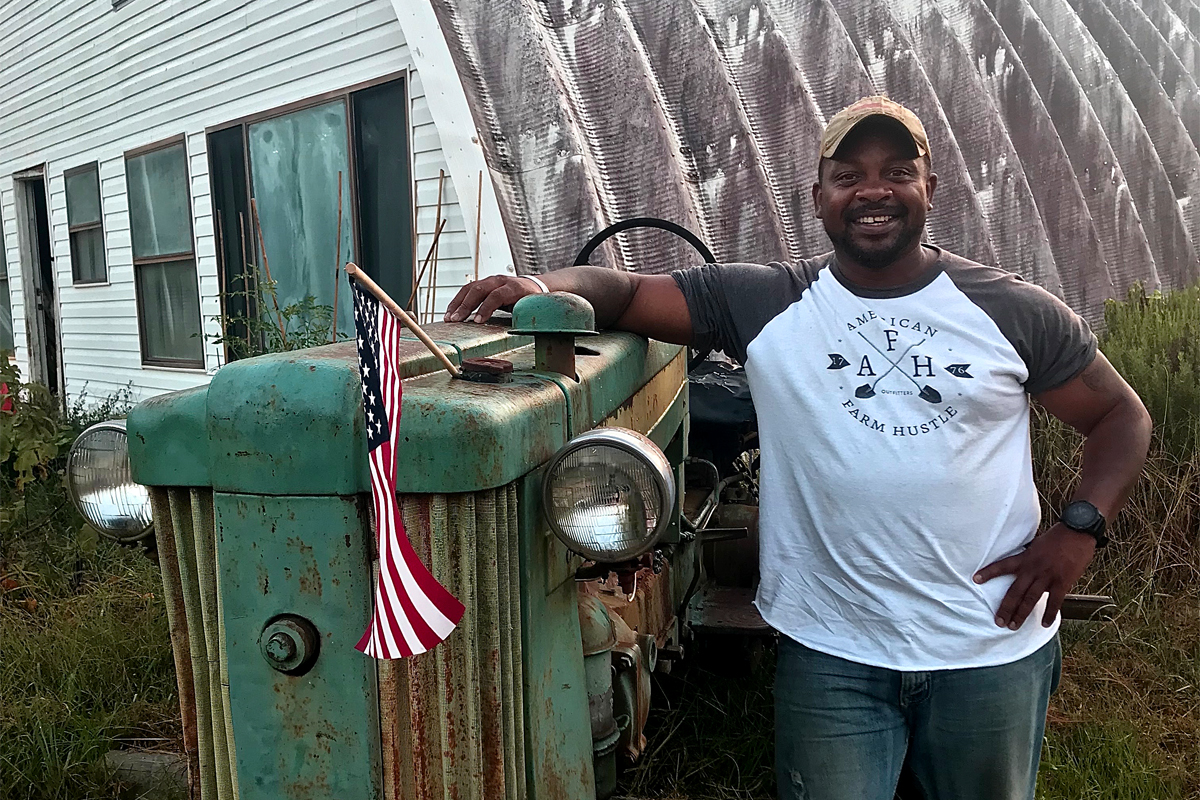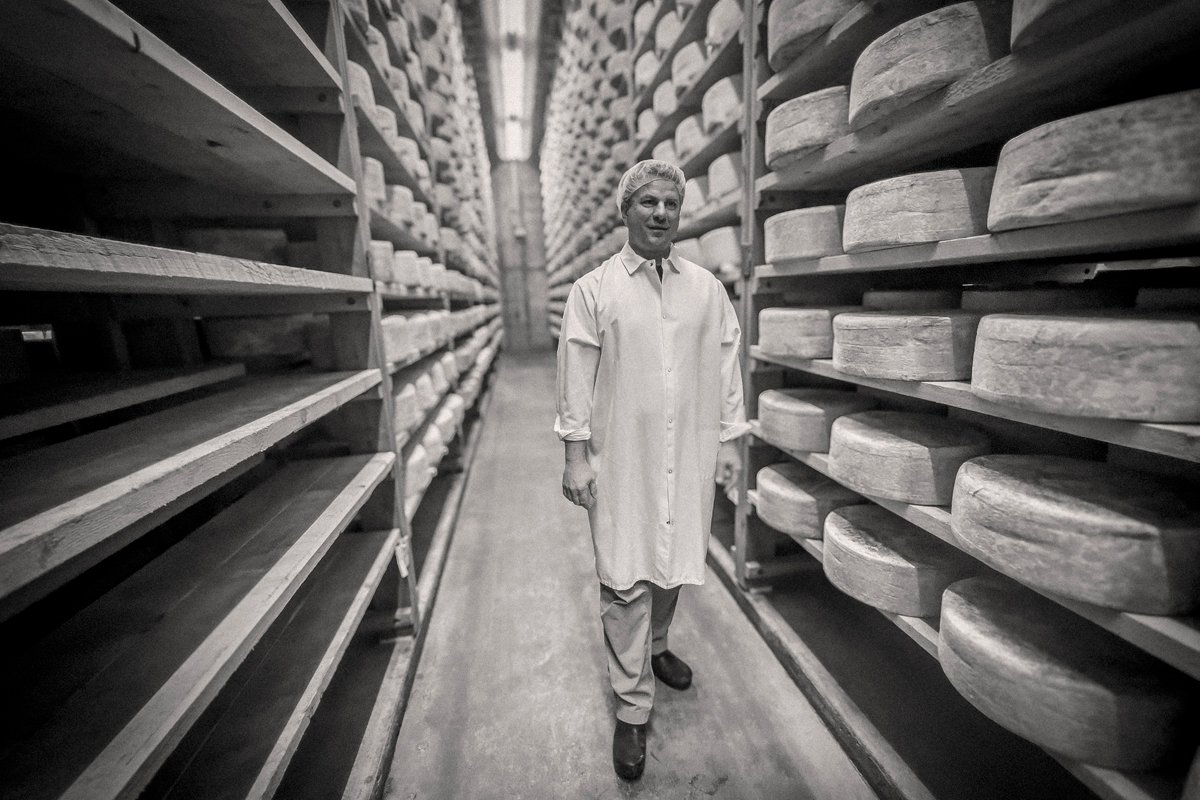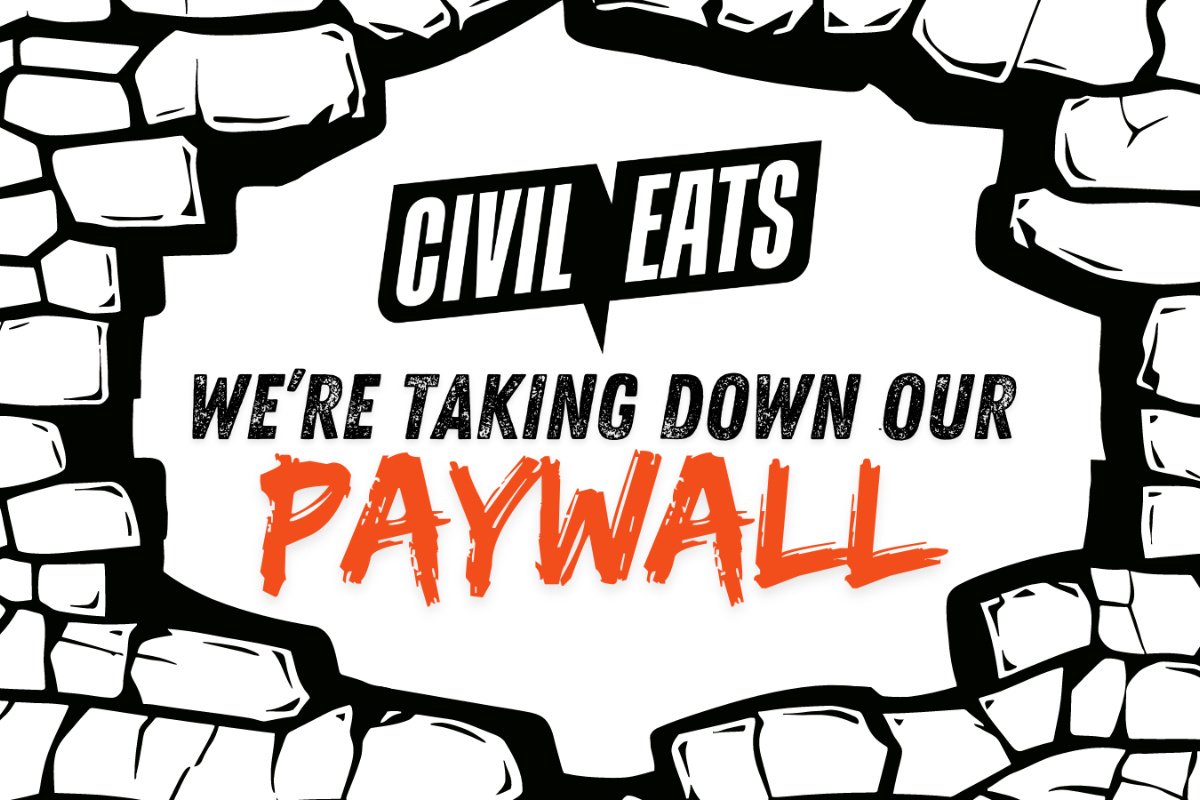The 20-acre central Georgia farm, founded by former U.S. Army Ranger Jon Jackson, helps struggling veterans find connection and belonging as they care for the land and animals.

The 20-acre central Georgia farm, founded by former U.S. Army Ranger Jon Jackson, helps struggling veterans find connection and belonging as they care for the land and animals.
November 11, 2019

In the Iraqi deserts and villages outside Baghdad, Troy Bowyer repaired tanks and other vehicles in two back-to-back tours as an Army mechanic. Six years ago, however, he was medically retired from the Army with a diagnosis of post-traumatic stress disorder (PTSD) with major depression and anxiety; he also suffered painful nerve damage in his back, legs, and arms. Bowyer was only 27 at the time, and it had been two years since he’d finished his second deployment—and about a year and a half since he had tried to end his own life.
Now living in Lizella, Georgia, Bowyer is working at an all-volunteer biodynamic farm in nearby Milledgeville. Today, he’s designing a watering system for the farm’s vegetables, poultry, and hogs that will automate a task now taking a couple of hours a day.
While his physical and psychological struggles continue, the farm gives him a purpose and a community, he says. “Getting out there is good, doing some hard work, whatever you may be able to handle,” he says. “Focusing on a small task kind of diverts your mind from all that pain… It gives you a small purpose.”
Founded by Army veteran Jon Jackson in 2014 as the first project of his nonprofit Stag Vets. Inc., Comfort Farms grows heirloom vegetables and raises heritage turkeys, hogs, hens, rabbits, and fish with the goal of helping veterans heal after their service. Veterans in immediate crisis—80 to 100 so far—work for days or weeks at the 20-acre operation while they wait for treatment with the Veterans Administration (VA)—and, if they’re interested, they can stay for longer.

Jon Jackson with some of his hogs. (Photo © Carlisle Kellam)
Most volunteer by the day, driving in from out of town or staying at local motels, but some live for about a week in the farm’s small cottage, which can house up to two veterans at a time, or in RVs parked on the farm. They find Comfort Farms largely through word of mouth from family, friends, or health care providers. Some, like Bowyer, have found it on Facebook.
A volunteer therapist screens newcomers and refers those with active addictions to rehabilitation centers so they can address their substance abuse before beginning work. While the farm does not provide formal clinical treatment, it does serve as a bridge to care, connecting veterans with a wide and supportive network of private therapists, people affiliated with the VA, and peer support. It also provides them physical activity, nutritious food, a structured schedule, and a sense of identity and purpose—all of which helps lay the foundation for healing. As the veterans connect with the land and animals through their work, they also begin to develop a sense of belonging among other vets, who innately understand what they’ve been through.
Jackson was inspired to start Comfort Farms in 2014 as he was leaving the military amidst the darkness of depression. “Because it didn’t exist, a place like this, I just decided, ‘You know what? I’m going to do it, I am going to follow my heart on this.’” he says. “I didn’t want any of my brothers and sisters to go through the same kind of thing [I was].”
Before founding Comfort Farms, Jackson served his six combat deployments as an Army Ranger, which the U.S. Army describes it’s “premier direct-action raid force.” Rangers, it goes on to say, are always “combat ready, mentally and physically tough, and prepared to fight our country’s adversaries.” With this role behind him, Jackson is well aware of the difficulty soldiers face coping with the transition from war zones to civilian life.
Perhaps the most discussed response to military combat is PTSD. But veterans can also grapple with depression and anxiety—thanks to their time in the field, but also thanks the pain of being separated from their families.
[newsmatch_box]Many veterans also lose their peers, and that numbs them, Jackson says. “I go out to battle, I lose my friend,” he says. “One day I am picking up his body parts, putting them in a bag, sending them home. I go out the next day, and the same thing happens. You lose a sense of yourself because you have to survive in that environment. So when vets come home, the thing they deal with the most is detachment and dissociation from family, intimacy, and touch.”
Additionally, leaving military life, with its camaraderie and clear sense of mission, can be rough. Soldiers move from an adrenaline-pumping world wherein they have a core group of buddies to an unanchored life back in the United States.
“There’s a loneliness and social alienation that happens for people making a transition back to the civilian world,” says C Sabathne, 39, a licensed family and marriage counselor who has volunteered with Comfort Farms since its early days and helps assess the veterans who work at Comfort Farms. Sabathne served as an infantry machine gunner and rifle team leader in the Army’s 82nd Airborne Division from 2000 to 2003 and during the invasion of Iraq and then spent eight years—including deployments—with the Army Reserve. “People going from, say, commanding a squad of nine people [to] suddenly working point-of-sale at a retail store answering to a 24-year-old hipster can feel a loss of purpose and identity,” he says.
Additionally, Sabathne says, “Recently separated service members often—mistakenly—think of the title of ‘Veteran’ as being about something they did in the past, sort of a ‘has-been.’ In fact, being a veteran isn’t about what we did once when we were young. It’s about who we are right now because of it.”
[pico_box]A task as basic as working with sows and their piglets can help veterans reconnect with their feelings, Jackson says. Later, that connectivity can transfer to veterans’ personal lives. Jackson has dubbed his approach of healing through farming “Agro-Cognitive Behavior Therapy,” and he’s collaborating with mental health professionals to codify what goes on at Comfort Farms.
Jackson spent his early childhood in Jersey City, New Jersey, with the Statue of Liberty and the New York skyline as the backdrop. As a young adult, he worked for six years in research labs for major pharmaceutical companies.
After September 11, Jackson, already facing a failed marriage, decided to enlist. He says the thought that occurred to him was, “Our country got attacked. There’s no time like the present—right now—to do something about it and be a part of the change.” His service ran from 2003 to 2015 and involved direct raids as a gunner on a Humvee with a .50-caliber machine gun, overseeing the movement of valuable equipment and personnel, and numerous classified missions.

Jon Jackson on his tractor. (Photo © Carlisle Kellam)
In 2013, however, the Army told Jackson he was not fit to deploy due to injuries sustained during battle, including traumatic brain injury. It was the same year he contemplated suicide.
Jackson describes himself as “100 percent disabled” by the combat tours; he was nearly killed 20 times by improvised explosive devices (IEDs), he says. The trauma of those deployments is still embedded in his body.
Four years ago, his wife took a picture of him with a flash camera, and that simple gesture reminded him of the experience of being in the blast radius of an IED. “You see the flash before you hear the bang. My body’s response to the flash is—I’m ready. That [response] is primitive and primal way more than I can rationalize.” He ended up in the shower, fully clothed and sobbing, for an hour.
Jackson had been gardening a patch of his backyard in Columbus, Georgia, between deployments. In 2014, he created the nonprofit, with Comfort Farms as its first venture, and used a bank loan to buy 20 acres.
Jackson named the farm after a buddy from his unit, Capt. Kyle A. Comfort, 27, who died in Afghanistan, from wounds he sustained when insurgents attacked their unit with an improvised explosive device.
Carlisle Kellam, a filmmaker producing a documentary about the farm, says its name works on multiple levels. “This isn’t just about comfort,” he says. “This is about getting out of your comfort zone and recognizing the fact that change has to be, or things are sacrificed for our well-being, whether it be people, animals, or other things.”
Jackson’s work on the farm over the last five years has helped him heal. “The farming practices that I use here have really helped me build back my skills for learning and recalling,” he says. “I feel sharp again. I feel as good as I was when I was an Army Ranger. I have a sense of accomplishment, a sense of giving back, a sense of service. For me, that’s just the most important thing.”
Comfort Farms relies on private donations as well as sales from its bimonthly farmers’ market and weekly deliveries of produce and meats to restaurants in Atlanta. Jackson describes the operation as biodynamic, and each part of the farm is integrated and interdependent, reflecting the kind of connected life that veterans volunteering there need.

Jon Jackson admires a wheelbarrow full of North Georgia Candy Roaster squash at Comfort Farms. (Photo by Allison Salerno)
Jackson and his crew grow heirloom vegetables, including North Georgia candy roaster squash, Creole Georgia collards, and Sea Island white flint corn, in raised beds. He loves heirlooms because “the artistry is within the seed,” he says.
“The overarching philosophy is that… we need to listen to our land; we need to listen to our plants. As seed growers and seed savers… we have to produce food in a way where we can carry on the traditions and preserve things.”
The farm employs the no-till Hügelkultur technique, which relies on decaying wood and other compostable biomass for soil fertility, water retention, and soil warming. It does not use herbicides of any kind. “We don’t even use organic-approved pesticides for our farm,” Jackson says. “We go above that, and we will identify where bugs are and if they’re eating a certain crop, we will go ahead and let them have that crop and almost kind of sacrifice that crop so that way we can grow other crops.” Additionally, they rely on “good old-fashioned going out there and squishing bugs with our fingers,” Jackson says.
The farm’s rabbits produce the manure that fertilizes the vegetables. From late spring into early fall, black soldier flies lay their eggs in the rabbit manure, and the high-protein larvae serve as feed for the farm’s animals and fish.
Among the animals who live on the farm are about 50 Bourbon Red turkeys, 70 American Mulefoot hogs, 40 hens, and 150 rabbits. Jackson is drawn to heritage breeds because he loves their history and wants to model for other would-be farmers how to maximize profits. “I can’t get $20 for a chicken, but I can get $20 for a duck, and a duck grows faster than a chicken, so why would I grow a chicken?”
The animals live in large pens where they can roam, and they eat a selection of things that grow on the farm, as well as a silage mix that has been fermented with molasses from corn grown on nearby dairy farms and contains sunflower seeds. They also eat the black soldier flies. Their seasonal diets give the hogs a unique flavor profile for diners in Atlanta restaurants. Spring hogs, for example, have been fed all through fall and winter, and eat a lot of pumpkins and sweet potatoes. Winter hogs have eaten summer foods: squash, melons, tomatoes, and cucumbers.

(Photo by Allison Salerno)
The rhythm of work on the farm varies with the season. Right now, veterans are planting onions, garlic, cabbage, and beans, along with 10 varieties of carrots. They are also feeding and watering the animals, breeding rabbits, moving animals from pen to pen, and preparing rabbits and turkeys for slaughter. In these cooler months, they also work on the farm’s infrastructure, including building raised beds.
Michael O’Gorman founded the Farmer Veteran Coalition in 2007 to help returning soldiers, a disproportionate number of whom are from rural areas, connect to farming. Americans who volunteered for military service after the September 11 attacks, including his own son, “went in with an enormous sense of purpose,” O’Gorman says. When they emerge, “farming can become their new mission,” he says. “It’s heroic. ‘We needed you to defend our country, and now we need you to feed it.’”
When O’Gorman founded his nonprofit 12 years ago, none of the 40,0000 groups helping veterans in the United States were focused on farming. Now 250 of them are. Jackson’s farm was one of the first, and he considers Jackson, who he views as charismatic and “larger than life,” as “a star among them.”
The first time Michael Wall, director of farm services for Georgia Organics, saw Jackson speak about healing through farming, he was deeply affected. “His story is very powerful,” Wall says. He believes Jackson has earned national recognition through speaking engagements and media coverage because he’s “a success story,” who is “also damn good at what he does.”

(Photo © Carlisle Kellam)
While Comfort Farms is not certified organic, it relies on many organic practices, and Jackson is a frequent keynote speaker at Georgia Organic’s conferences. “It’s very important to put up a successful model of a veteran and a Black farmer in Georgia, because both [groups] have been tremendously othered and disenfranchised by the agricultural industry for hundreds of years, and it hasn’t stopped,” Wall says.
Jackson’s range of vision is wide. For example, right now, the musty Quonset hut near the farm’s entrance stores farm equipment. Jackson would like to raise private funds to transform it into what he calls an “agro-culinary academy” to provide critical job training to veterans who have struggled with addiction, mental illnesses, and homelessness.
And that drive to help others can be contagious. Troy Bowyer says volunteering at Comfort Farms has given him a sense of purpose. “What Jon has built up is amazing,” he says, “and the more effective we can get it going, the more veterans we’re going to be able to help.”

September 4, 2024
By paying top dollar for milk and sourcing within 15 miles of its creamery, Jasper Hill supports an entire community.
September 3, 2024

August 27, 2024

August 26, 2024

Like the story?
Join the conversation.